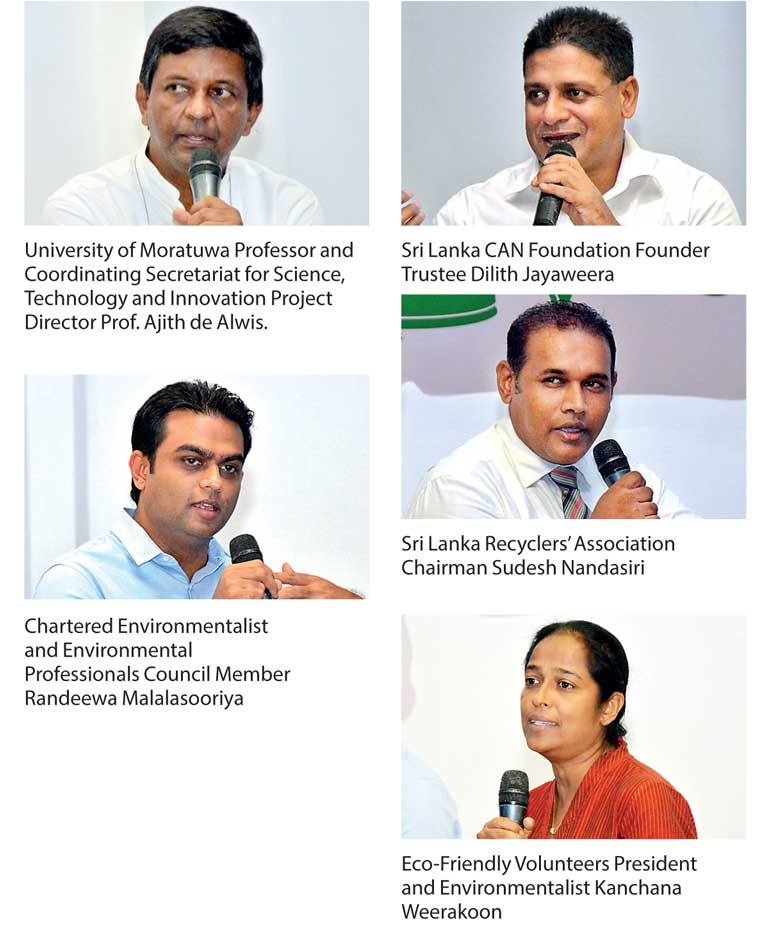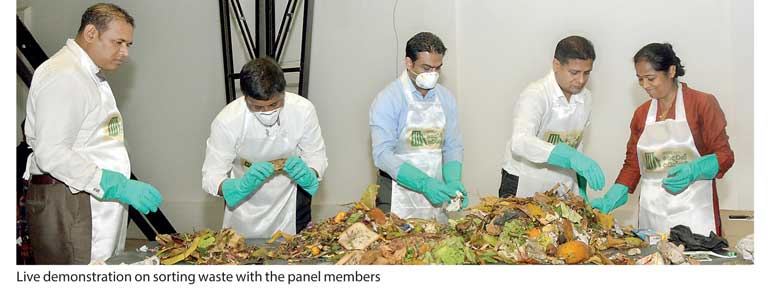Saturday Feb 21, 2026
Saturday Feb 21, 2026
Friday, 5 May 2017 00:10 - - {{hitsCtrl.values.hits}}
 By Asnah Anver
By Asnah Anver
In the wake of the recent Meethotamulla garbage dump collapse and the resultant public outcry, a new initiative to promote environmentally friendly garbage disposal practices at home was kick-started last week.
The campaign titled ‘Clean Lanka – Let’s Begin From Home’ is an initiative of the Sri Lanka CAN Foundation and aims to introduce a pragmatic and sustainable solution to the larger issue. Accordingly, ‘Clean Lanka’ works to empower citizens across the country, conveying the importance of individual responsibility and conscious waste management and raising awareness on systematically managing household waste while greatly minimising the garbage output, with the ultimate goal of zero waste. The initiative is primarily driven by the concepts of Refuse, Reduce, Reuse, Recycle and Upcycle and stresses the need to segregate waste for this purpose.
Noting that the waste problem predates the recent disaster, Milinda Rajapakse, representing Sri Lanka CAN Foundation, pointed to the alarming statistics. On a daily basis Colombo is frequented by approximately three million people, who unwittingly contribute towards the surmounting garbage problem, producing 1,200 tons of waste per day. Furthermore, 15 million plastic lunch sheets and 20 million plastic shopping bags are used in Sri Lanka per day—and although approximately 40% of this can be recycled, only 10% is as of now.
Having observed that despite the gravity of the problem people tend to overlook the possibility of proactive individual contribution and the impact it can have on achieving a lasting solution, the Sri Lanka CAN Foundation began the ‘Clean Lanka’ initiative to motivate individuals to proactively start from their very homes. It is expected that this would in turn trigger a chain reaction to disseminate the message from the family to the larger community, ultimately driving the entire nation towards a constructive and holistic attitudinal change, and zero waste at the household level.
As a part of the campaign, steps are being taken to disseminate the message through all media including digital and social media, adapting a 360 degree campaign strategy. Sri Lanka CAN Foundation Founder Trustee Dilith Jayaweera speaking at the inaugural program expressed confidence that the Sri Lanka CAN Foundation would be able to effectively communicate the message. Jayaweera stated that there will also be a lot of activation on the ground level involving a lot of volunteers, adding that “until we achieve this objective we will be there on the ground”.
For instance plans were underway to be present at the May Day rallies, conduct programs in schools, and host ‘kunu dhansalas’ during Vesak to spread awareness on segregating waste. In conjunction with the initiative, discussion will also be carried out with reputed religious programmes.
At a panel discussion held it was in general agreement that there needs to be a change in attitudes, behaviour and thinking for effective waste management. The panel consisted of industry professionals and experts such as University of Moratuwa Professor and Coordinating Secretariat for Science, Technology and Innovation Project Director Prof. Ajith de Alwis, Sri Lanka Recycler’s Association Chairman Sudesh Nandasiri, Chartered Environmentalist and Environmental Professionals Council Member Randeewa Malalasooriya, Eco-Friendly Volunteers President and Environmentalist Kanchana Weerakoon and Sri Lanka CAN Foundation Founder Trustee Dilith Jayaweera.
Speaking at the event Prof. de Alwis stated that by utilising scientific methods, it is possible to move towards zero waste, but there needs to be an attitudinal change as well. Nandasiri pointed to the value of waste as a resource: “Waste is a surprising thing, which if handled well can yield surprising results. It can be turned to an industry in and of itself and can also become finished products.”
Malalasooriya speaking on waste management noted: “What we must understand is that there is something that all of us can do, as citizens By changing our behaviour we can contribute to the solution to this problem.”
Weerakoon emphasised the importance of targeting the home as a locus for habit change, and noted the need to shift from “an ego-centric thinking to an eco-centric thinking” while also speaking on best practices such as making eco-bricks with the waste that cannot be recycled.
Meanwhile, Attorney and Activist Nuwan Bopage who was among the audience stated that the attitudinal change needs to also move beyond to feed into the policies and laws of the country.
At the end of the discussion, there was a demonstration by the panel members whereby waste was segregated into plastic, glass, paper and organic waste. The demonstration served to prove that much of the household waste if separated can be recycled.
The inaugural program of ‘Clean Lanka’ was held at IdeaHell in Colpetty on 27 April, with the participation of media, industry experts, religious leaders and intellectuals to raise awareness on the objectives of the Initiative and demonstrate best practices on conscious waste management.
Pix by Upul Abayasekera